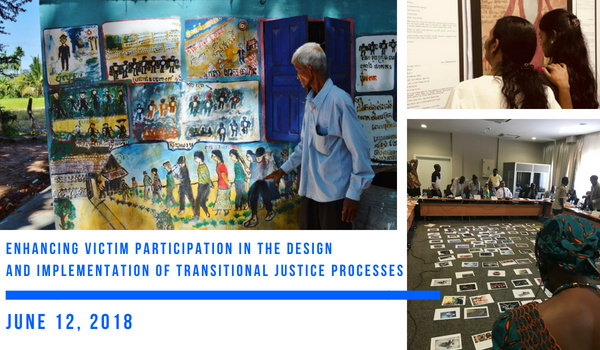
Webinar: Enhancing Victim Participation in the Design and Implementation of Transitional Justice Processes
Join the American Bar Association Rule of Law Initiative (ABA ROLI), together with its partner, the Global Initiative for Justice, Truth and Reconciliation (GIJTR), for a webinar on enhancing victim participation in the design and implementation of transitional justice processes.
Date: June 12, 2018
Time: 9 am Washington, DC; 1 pm Freetown; 3 pm Amsterdam; 4 pm Nairobi; 8 pm Bangkok
Location: Online webinar (Login details will be sent upon registration)
Format: 40-minute presentation followed by 50 minutes of Q&A.
Registration: Sign up for free here
Facilitator:
Sara Bradshaw , Senior Program Manager, Global Transitional Justice Initiative, International Coalition of Sites of Conscience
Speakers:
- Ram Kumar Bhandari , human rights activist, President, National Network of Families of the Disappeared, Nepal
- Aimee Ongeso , Program Manager, Public International Law & Policy Group, Kenya
- Brahmy Poologasingham , Team Lead, Transitional Justice and Conflict Resolution, Bureau of Democracy, Human Rights and Labor, GP, U.S. Department of State
- Jennifer Tsai , Senior Advisor, Access to Justice, ABA ROLI @jennifertsai
Background: Transitional justice describes a range of strategies that are intended to respond to a period of systematic or widespread human rights violations, and promote accountability, reconciliation, truth, memorialization and, ultimately, peace. However, many national mechanisms may tend to exclude poorer and more marginalized citizens, due to a number of shortcomings such as the influence of politics in these spaces, a lack of political will, institutional constraints and timing difficulties. These challenges attest to the complexities of designing and implementing inclusive, participatory transitional justice processes. In the absence of national mechanisms that foster meaningful participation, or when these processes are delayed, local-level processes often develop to fill the vacuum left by national or international mechanisms. Local-level processes may create opportunities for communities to participate in their design and implementation, and serve as a stepping stone to community participation in national and, even international, processes.
This webinar will convene a range of experts to examine the interaction between local-level and national transitional justice processes and the ability of local-level transitional justice processes to foster victim and community participation. The event will also launch the GITJR’s new publication, " Strengthening Participation in Local-level and National Transitional Justice Processes: A Guide for Practitioners " — a comprehensive guide for civil society organizations, activists and policy practitioners who are working to engage victims more fully in transitional justice processes at the national and local levels.
The webinar is brought to you by ABA ROLI, in partnership with the GIJTR.